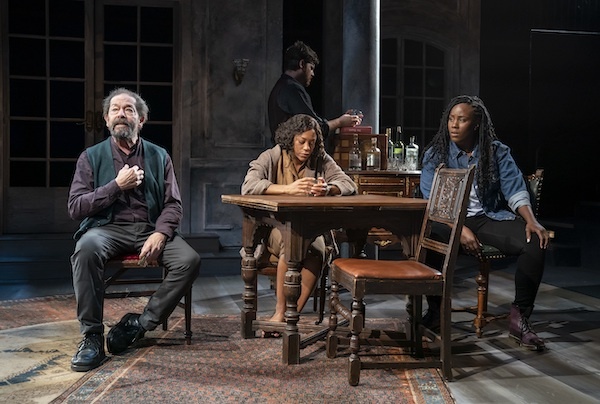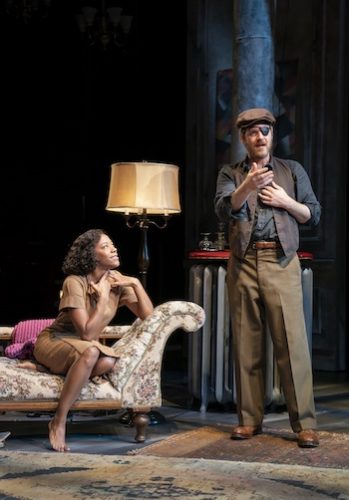Theater Review: A Three-Hour “Bright Room Called Day” Befuddles at the Public Theater
By Christopher Caggiano
Tony Kushner attempts a rewrite of his first professional play. The results are decidedly mixed.
A Bright Room Called Day (Revisited) by Tony Kushner. Directed by Oskar Eustis. At the Public Theater, 425 Lafayette Street, New York, NY., through December 15.

Jonathan Hadary, Nikki M. James, Michael Esper, and Crystal Lucas-Perry in the revamped “A Bright Room Called Day” at the Public Theater. Photo: Joan Marcus.
It’s rare that artists get a do-over in their careers. But that’s exactly what Pulitzer Prize- and Tony Award-winning playwright Tony Kushner is experiencing now at the Public Theater by way of a revised version of his first professionally produced play, A Bright Room Called Day, here called A Bright Room Called Day (Revisited).
Kushner’s 1985 play is about the rising specter of fascism in 1930s Germany, although the script draws numerous parallels between the rise of the Nazi Party and the dawn of the Reagan Era. Critics at the time scoffed at what they saw as the drama’s hyperbole. Given our current political climate, what once may have seemed alarmist now appears all too real. Trump’s coming to power must have seemed to be the perfect time to revisit the play to both Kushner and to director Oskar Eustis, who also directed the script’s professional premiere in 1987.
Kushner’s revisions come predominantly with respect to a character called Zillah, who is part of a meta-construction that regularly interrupts the action of the play with commentary in order to draw contemporary parallels. For the latest version, Kushner has added another meta-character called Xillah, who is essentially a stand-in for the playwright himself.
The interactions between Zillah (played by Crystal Lucas-Perry) and Xillah (a vibrant and frazzled Jonathan Hadary) provide much of the clarity in this revamped version of the script. The 1930s scenes can be oblique, poetic to the point of opacity. Ironically, the meta interludes set into relief many of the play’s flaws. Kushner appears to want to use his new proxy character to address criticisms of the earlier version of the drama. But these protestations come off as diversionary excuses: snarky asides in lieu of actually fixing the piece.
At one point in the revised version, Zillah proclaims,“Things are so bad people want to do this play.” But she immediately accedes that, even in this revised form, the play is unlikely to help. Is Kushner conceding that the play is never going to work? Or is he lamenting the limited effect a play can have on its political environment? Either way, it feels like a cop-out. At another point, Kushner appears to be both throwing up his hands and settling an old score:
Xillah: “But I didn’t trust the play, the dramatic form itself…to speak directly enough…”
Zillah: “Which is why no one in your plays ever moves. They just sit and talk.”
Xillah: “That’s all anyone does in any play. It’s all plays are is talk. What else should they be doing, sword fighting?”

Nikki M. James and Michael Esper in the revamped “A Bright Room Called Day” at the Public Theater. Photo: Joan Marcus.
At its best, A Bright Room Called Day (Revisited) is a play to begrudgingly admire, if not wholeheartedly embrace. This is the theatrical equivalent of eating your vegetables. Kushner’s writing here in some ways reflects the lyricism and intellectual ambition of his Angels in America, but Bright Room exhibits precious little of the heart and sheer visceral impact of Kushner’s magnum opus.
The first-rate performers in the cast do what they can to inject passion and dimension into Kushner’s archetypal characters. Linda Emond is intensely real, as always, as a poster artist who helps spearhead the resistance to the Nazis. Nikki M. James feels miscast as Agnes, a film actress who is forced to choose between leaving Germany and remaining behind. James seems to lack sufficient gravitas for the role, although she partially acquits herself at the very end.
Estelle Parsons is virtually unrecognizable as an inscrutably ominous elderly woman who haunts Agnes while Agnes dithers. Michael Urie is unique among the cast in making his character, a gay man working to promote sexual freedom, both palpable and sympathetic.
At the core of Bright Day is a debate about the practical uses of art to effect change. In one scene, Xillah cries out in despair at the helplessness of the theater artist: “The magic within this room, it isn’t useless, it has some effect, but…[w]hat effect? On us in here? Out there in the world? What powers of the air above or below the earth do we conjure forth in here?”
At the end of a somewhat rambling three hours, Kushner apparently comes to a resolution. The Zillah character breaks though the fourth wall and speaks directly to Agnes in the hopes of saving the character from her impending doom. Agnes instead turns the discussion around and insists that it is Zillah — and, by extension, the audience — who must take action: “And if they win, there will be no safety anywhere, anywhere in this world…and there will be no future. We are in terrible danger. Save this world…Leave this room. Act.”
Powerful words, but coming as they do after an attenuated three hours of dithering, they lose their power as a rallying cry and become more of a shrill taunt.
Christopher Caggiano is a writer and teacher based in Boston. He serves as Associate Professor of Theater at the Boston Conservatory at Berklee. His writing has appeared in American Theatre and Dramatics magazines, and on TheaterMania.com and ZEALnyc.com.
Tagged: A Bright Room Called Day (Revisited), Christopher Caggiano
